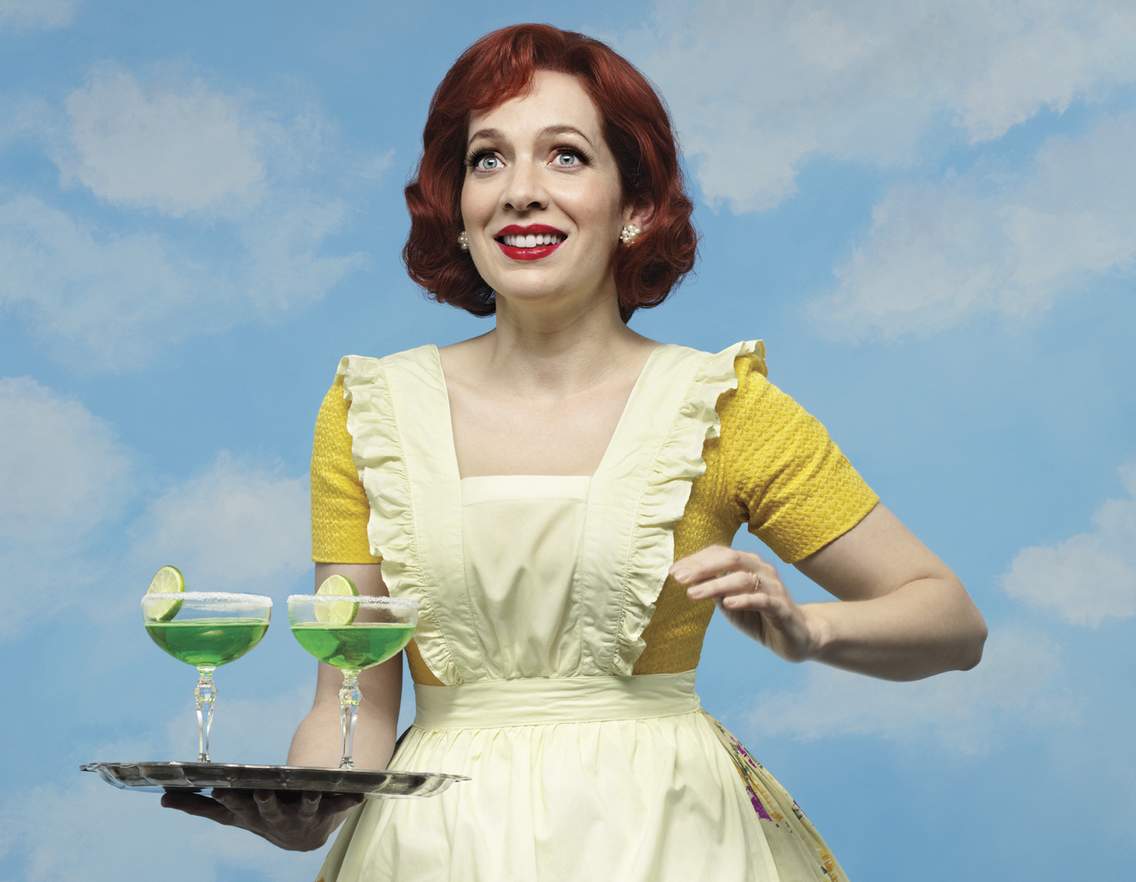
Before the action starts, we can hear a string of songs from the 1950s, including The Platters’ The Great Pretender. What follows will have much to do with pretence. Jointly produced by The National Theatre and Theatr Clwyd, Home, I’m Darling is a humdinger of a play.
Writer Laura Wade analyses a wide range of gender-related issues with forensic precision and sparkling wit, and often challenges conventional expectations and stereotypes. It is the story of a dutiful housewife whose day is filled with domestic drudgery, and a husband who appears content to have her attend to his every need. Yet he is by no means the villain of this story, for this is a lifestyle choice that she has freely made. But can a lifestyle be a proper substitute for real life? And does a modern woman have the right to turn her back on the hard-won freedoms achieved by the feminist cause?
These are just some of the questions raised in a play that sparkles with ideas as bright and shiny as the Formica surfaces in Johnny and Judy’s 1950s dream home. A dream? Possibly, though in Anna Fleischle’s clever set design this is a home that is perhaps a little too bright, too sparkly. There is a kind of desperate cheerfulness in all the décor, right down to the flamingos on the shower curtain in their determinedly pink bathroom. There is a desperate cheerfulness about Judy, too. When we first see her it’s breakfast time, and she seems to be blissfully happy making tea and chatting merrily to Johnny, but there’s a sense that everything is too jolly to be true. In true 1950s fashion Judy butters Johnny’s toast, pours his tea from a proper teapot, and cheerfully waves him off to work. Then she sits down… and takes a laptop from a drawer. We are not in the 1950s at all. That laptop is the first of many surprises.
Judy is in retreat from the present day. All the old certainties about gender-roles may have been consigned to the dustbin of history, but she has a nostalgic yearning for a time when her place in the scheme of things would have been clearly defined. Once she worked in finance and earned more than her husband, but now she claims to find pleasure in frugality. She enjoys staying at home, cleaning and cooking, even though the role of the traditional housewife is undervalued – ‘We don’t value housework because men don’t do it’. However, cracks are appearing in her pretence to be the perfect 1950s homebody. It may be that staying at home to ‘clean behind things’ is a luxury she cannot afford. Brilliantly capturing Judy’s outward cheerfulness and inner fragility, Katherine Parkinson’s performance is comic, but it never descends into parody. There are aspects of Judy’s character that are less than admirable, even downright silly, but we also see that this is someone who has found herself lost and frightened in the twenty-first century. In her cosy version of the 1950s she somehow feels safe, but she is well aware that her rejection of the contemporary world is half-hearted and compromised. She believes that ‘the old ways are the best’, but she has to find out about those old ways on the internet, and she buys her gingham frocks on eBay.
Judy is mercilessly mocked by Sylvia, her ardently feminist mother, played with sharp-tongued vigour by Susan Brown. In the second half of the play Sylvia mounts a withering attack on Judy’s Technicolor version of the 1950s, describing a decade that was in fact cold and grey, and pretty hostile if you were anything other than a straight, white male. How, she asks her daughter, can you be nostalgic for the 1950s ‘when you weren’t even there?’ She mourns for all those women for whom married life proved to be a ‘bitter little existence’, ending in profound disappointment. It’s a speech that packs a real punch.
Jo Stone-Fewings gives a cleverly nuanced portrayal of Johnny, the affable husband who has willingly become a partner in Judy’s project to re-create the 1950s, but whose failure to win promotion brings about a financial crisis. Although he is the beneficiary of all of Judy’s wifely attentions, there is always a sense that he is going along with role-play to please her, rather than himself. At one point he claims that her insistence on doing everything for him has made him ‘feel like a child’. Their closest friends are Fran and Marcus. Fran, played by Siubhan Harrison, indulges Judy’s fantasy because she likes the clothes and the fun of it. She and her husband Marcus, played by Hywel Morgan, also like the music, and their expert jiving is cleverly used to link scenes together. Marcus is overly ‘huggy’, with an outdated understanding of where some important boundaries are located. In the 1950s his behaviour may have gone unremarked, but today it causes him to lose his job. Judy is initially sympathetic, but when Marcus shows her just how tactile he is inclined to be, she comes to realise that there are some aspects of the 1950s that even she has to reject.
Directed with skill by Tamara Harvey, Home, I’m Darling moves along with great energy. I find the final tidying up of loose ends a little too neat, but I cannot remember the last time I enjoyed a new play quite so much, for there is never a dull moment in this superb production. Home, I’m Darling is packed with ideas, but it is never stodgy. It is surely destined to become a modern classic. ★★★★★ Mike Whitton 17th April 2019


